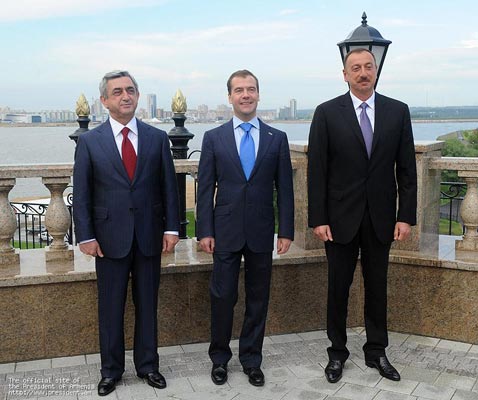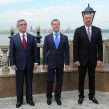
Kazan Summit Breaks Hearts In Baku
Publication: Eurasia Daily Monitor Volume: 8 Issue: 126
By:

Despite continued failures of the peace talks during the last 17 years (since the ceasefire agreement was signed in 1994), every new meeting between Azerbaijani and Armenian presidents raises high hopes in Baku for a breakthrough in the deadlocked negotiations. The Kazan summit on June 24, in which the two presidents met with their Russian counterpart Dmitry Medvedev (the second such meeting in 2011 and ninth in general), was not only an exception to this hope, but added extra expectations. International analysts and media outlets, including The New York Times and The Washington Post suddenly proclaimed that a real chance for a breakthrough existed. US President Barack Obama telephoned the respective leaders of the warring sides urging them to conclude the peace deal, and French President Nicholas Sarkozy even sent a written message calling for “the path of wisdom, courage and peace.”
Yet, as hopes and expectations accumulated prior to the meeting, the more painful it became to realize that the two sides failed once again to reach an agreement and come to a compromise regarding the so called Basic Principles, proposed by the mediators. Frustration is perhaps the best word to describe the feelings after the Kazan meeting. Reportedly, President Ilham Aliyev was so upset that he left the Russian city earlier than planned, not staying for the famous horse races (Yeni Musavat, June 26). Moreover, the Russian daily Kommersant reported that President Medvedev was so disappointed that he would decline to host another such meeting unless the two presidents provide firm assurances that the peace agreement will be signed (Kommersant, June 27).
One can argue that the Kazan summit was the highlight of the negotiation process, which has been ongoing since 2005. Realization that this process has reached a dead-end not only frustrates Azerbaijanis, who were hoping for the final return of the occupied territories, but also raises questions about the future scenario for this conflict’s resolution. It is obvious that Armenia, holding some 20 percent of Azerbaijan’s internationally recognized territory is not willing to give it back and is simply dragging out time to win international legitimization for this occupation.
The staging of a military parade in Baku two days after the failed talks is seen by some analysts as one way in which the Azerbaijani government will prefer to develop its future tactics. If the long-standing peace talks do not produce results, many Azerbaijanis wonder whether war is the final option. In fact, Azerbaijan has been investing in its defense forces in the last decade. During the parade, President Aliyev once again mentioned that the economic growth of the country has allowed increasing the military budget 20-fold, making it more than $3 billion. “Azerbaijan’s military budget alone is higher than the total state budget of Armenia,” Aliyev emphasized during the event (AZTV, June 26).
Meanwhile, President Medvedev has signed a decree about the prolongation of the presence of Russian military bases on the territory of Armenia until 2044. This and other forms of Russian military assistance to Armenia raise concerns about the neutral mediation by the Kremlin and point to the growing arms race in the region. Should war erupt, it would be costly and detrimental for the economic development of the region, so Azerbaijan will continue to put diplomatic pressure on Armenia to liberate the occupied lands.
The popular Azerbaijani news portal 1news.az pointed out the unwillingness of the Armenian side to give back Azerbaijani lands by showing examples of street rallies in Yerevan against the possible concessions in Kazan. The news portal also printed the Armenian president’s statement in an interview to Euronews about “not expecting too much from the Kazan meeting” as well as other similar comments from the representatives of the ruling Republican party in Yerevan. Either the Armenian political leadership does not want to risk agreeing to the Basic Principles offered by the mediators or they are not interested in peace at all, preferring to keep the occupied lands against all norms of international law (www.Euronews.net, June 23).
Azerbaijani Member of Parliament, Musa Gasimli, summed it up well in his interview to Public TV on June 28, “Armenia’s actions are encouraged by the international community. If the latter does not make a distinction between the occupant and occupier, if the international community does not punish the aggressor, the peace deal will never be reached and Armenia will never free the occupied territories” (Public TV, June 28).




